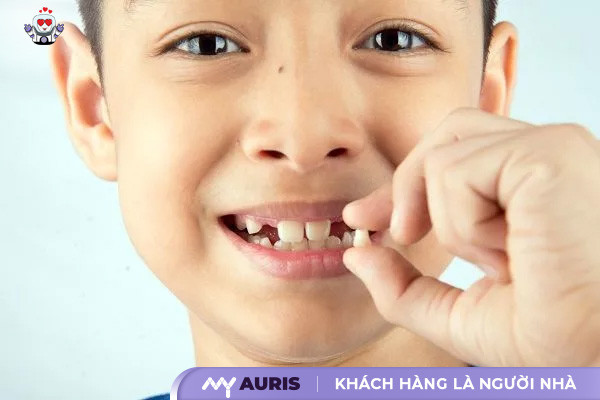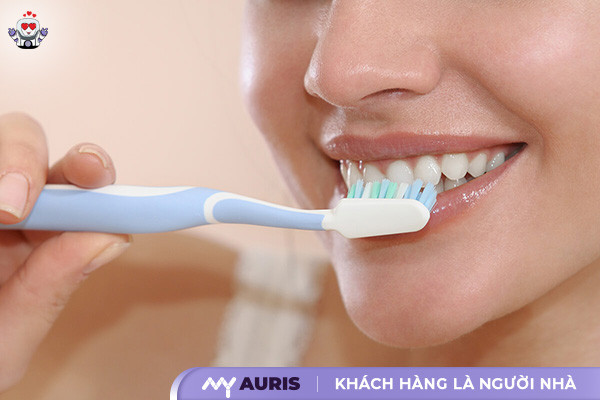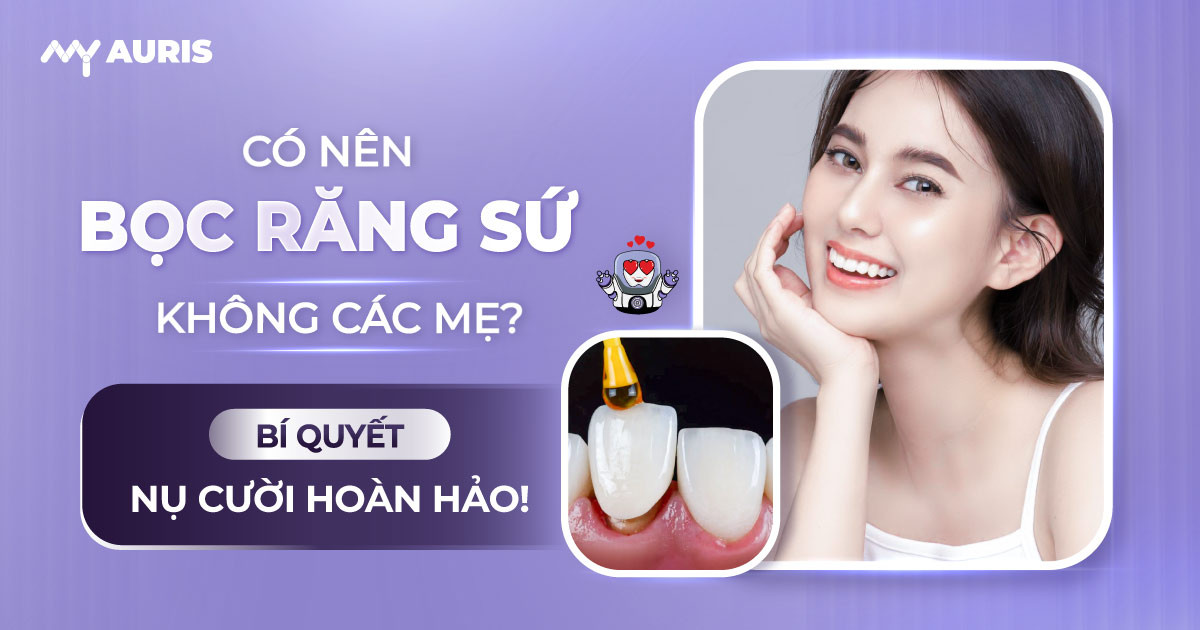Porcelain veneers are currently one of the popular cosmetic dentistry methods, effectively addressing issues such as discolored, chipped, broken, or yellowed teeth. It’s a quick solution to achieve a bright, even smile, but does it affect health, especially for children under 18? So, should mothers consider porcelain veneers? To make an informed decision, let My Auris help you understand the benefits, risks, and important considerations for porcelain veneers in the article below!
Can 13, 14, 15, or 16-year-olds get porcelain veneers?
Dental professionals usually advise against porcelain veneer application for adolescents aged 13, 14, 15, 16, or 17. The reason is that during this period, teeth and jawbones have not yet fully developed. Some children have replaced their primary teeth with permanent ones, but there are still cases where permanent teeth have not fully erupted. Applying porcelain veneers at this stage can affect oral health and tooth development.
However, this is not an absolute rule. In some cases, adolescents aged 13-17 may be able to get porcelain veneers if a dentist determines that their teeth and gums are suitable. This is typically considered in the following situations:
Permanent teeth are severely decayed, fractured, or have pulp inflammation that cannot be restored by other methods.
In such cases, porcelain veneers can help protect the natural teeth and prevent the infection from worsening.
Porcelain veneer application for adolescents should only be performed after a thorough evaluation by a specialized dental professional.
The teeth requiring veneers must meet the necessary conditions, including the complete shedding of primary teeth and the stable formation of permanent teeth.

Ideal age for porcelain veneers
The age for porcelain veneer application is a crucial factor determining the safety and effectiveness of the treatment. According to dental experts, while each person’s tooth development rate varies, the basic condition for veneers is that permanent teeth have fully erupted.
Dentists recommend the ideal age for porcelain veneers is 18 years or older. By then, permanent teeth are fully developed, and jawbones are stable, helping to avoid complications and ensure optimal results.
In some special cases, porcelain veneers for children may be considered if they have severe tooth decay affecting other teeth. The dentist will thoroughly assess the child’s dental condition, oral health, and age before proposing a suitable dental treatment plan.
Regardless of the age for porcelain veneer application, regular dental check-ups (at least every 6 months) are essential. This helps monitor tooth condition, prevent issues, and replace veneers when necessary.
Should mothers consider porcelain veneers?
Is applying porcelain veneers for children, especially under 16, truly necessary? According to experts, this decision depends on the child’s specific oral condition. Important factors to consider are whether the child has shed all primary teeth and whether permanent teeth have fully developed. Dentists advise against applying porcelain veneers too early, with the ideal time being after 18, when the jawbone and teeth are fully mature.
Young children have thin tooth enamel and unstable teeth, making them prone to sensitivity and pain if veneers are applied. Performing the procedure too early can lead to gum inflammation, pulp damage, and reduce the lifespan of the teeth. Additionally, children are not yet fully aware of proper oral hygiene, which can easily lead to discolored or chipped teeth.
However, in certain cases such as severe tooth decay that cannot be filled, or chipped/broken teeth due to an accident, the dentist may consider porcelain veneers to protect adjacent teeth from widespread damage. The choice of appropriate method will be advised by the dentist based on the child’s specific oral condition.

Should adults get porcelain veneers?
Porcelain veneer application is a popular cosmetic dental procedure that helps correct tooth imperfections. If performed by a skilled dentist using modern medical equipment and ensuring the correct tooth preparation ratio, this method does not affect the natural tooth tissue.
Benefits of porcelain veneers:
Porcelain teeth have a shape, size, and color similar to natural teeth, providing a confident smile. The stain-resistant coating prevents teeth from discoloring due to food.
Porcelain teeth have high hardness, even superior to natural teeth. For example, metal-ceramic crowns have a hardness of 360MPa, while all-ceramic crowns can reach up to 900MPa.
If performed correctly, porcelain veneer application does not cause long-term sensitivity, only discomfort for the first 1-2 days.
Metal-ceramic crowns have a lifespan of 7-10 years, while all-ceramic crowns can last 15-20 years.
It only takes 2-3 days to complete the veneer application process.
Veneers make oral hygiene easier, reducing plaque and bacteria accumulation between teeth.
The porcelain crown acts like a shield, protecting the tooth from external forces and bacteria.
When should porcelain veneers be performed for children?
Applying porcelain veneers for adolescents, especially at age 14, requires careful consideration as the jawbone is still developing and teeth are not fully mature. According to dentists, if there are no mandatory circumstances, children of this age should not get porcelain veneers. However, in some special cases, treatment may be necessary.
When tooth decay in children progresses severely, traditional fillings may no longer be effective. If not treated promptly, tooth decay risks spreading to adjacent teeth, affecting permanent teeth. In this situation, the dentist will thoroughly evaluate and propose an appropriate porcelain veneer treatment plan.
Accidents or dental trauma in children can cause severe tooth fractures that cannot be restored with fillings. To protect the natural tooth and maintain chewing function, the dentist will consider porcelain veneers with suitable materials to ensure durability and safety.

Cases where 18-year-olds should not get porcelain veneers
Permanent teeth not fully developed
At age 18, some adolescents’ permanent teeth may not have fully developed. Applying porcelain veneers for children during this period can put pressure on adjacent teeth, lead to malocclusion, and negatively affect chewing function. Therefore, if the teeth are not stable, parents should consider carefully before allowing their child to get porcelain veneers.
Children with systemic diseases
Children with systemic diseases such as cardiovascular issues, hemophilia, etc., are generally not recommended for porcelain veneers. This is because the procedure requires the use of local anesthesia, which can cause side effects and impact health. In such cases, parents should consult a dentist before making a decision.
Severe malocclusion
For children with severe malocclusion, orthodontic braces are a better solution than porcelain veneers. Adjusting the teeth to their correct position helps improve occlusion and ensures proper chewing function. After completing orthodontic treatment, if the teeth show signs of discoloration, yellowing, and the child meets the conditions, porcelain veneers can be an effective option for cosmetic improvement.
Sensitive teeth
Applying porcelain veneers requires tooth preparation (grinding down the tooth), a process that can cause pain and damage the dental pulp if the tooth is too sensitive. When the pulp is affected, the child may experience prolonged sensitivity, weakening the tooth and reducing chewing ability. Therefore, for cases of overly sensitive teeth, careful consideration is needed before proceeding with porcelain veneers.
Severely fractured tooth, only root remains
If a tooth is severely damaged, with only a small root remaining, porcelain veneers cannot be securely fixed. In this case, the dentist may recommend removing the root and using a space maintainer to prevent other teeth from shifting. Once the child turns 18, dental implants are the optimal solution to restore chewing function and prevent bone loss.

How to care for children’s oral health to avoid early porcelain veneers
Applying porcelain veneers for children, especially under 18, requires careful consideration. To limit the need for early porcelain veneers, parents should teach children proper oral hygiene from a young age. Here are effective solutions to help children maintain good oral health and avoid dental diseases:
Brush all tooth surfaces: outer, inner, and chewing surfaces.
Brush teeth twice a day, for at least 2 minutes each time.
Use a soft-bristled toothbrush and fluoride toothpaste to protect tooth enamel.
Limit sweets such as candies, pastries, and sugary sodas – major causes of tooth decay.
Supplement teeth-friendly foods like milk, cheese, green vegetables, and nuts to strengthen calcium and protect teeth.
Encourage children to drink water after eating to remove bacteria and plaque from teeth.
Have children wear a mouthguard at night to limit the effects of teeth grinding.
Provide protective gear during sports to reduce the risk of tooth injuries.
Take children to a pediatric dentist for check-ups every 6 months to detect any abnormalities early.
Timely address cases of tooth decay or misaligned teeth to avoid affecting later oral development.
Before making a decision, children need to be thoroughly examined by a specialist to ensure safety and effectiveness. Children’s orthodontics or other restorative methods would be more suitable than applying porcelain veneers under 18. Therefore, to best protect your child’s oral health, guide them in scientific oral care starting today!





